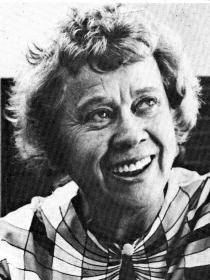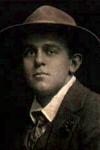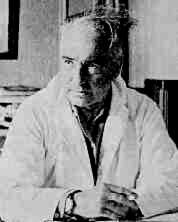Re
Reed, Evelyn (1905-1979)
 American Socialist-feminist author who pioneered investigation of the natural and social sciences to expose the sexism built into these sciences; a member of the American Trotskyist Socialist Workers Party.
American Socialist-feminist author who pioneered investigation of the natural and social sciences to expose the sexism built into these sciences; a member of the American Trotskyist Socialist Workers Party.
Her Woman’s Evolution pioneered feminist critique of the sciences and is widely read to this day. Other important works include Cosmetics, Fashions and the Exploitation of Women, Sexism and Science and Is Biology Woman’s Destiny.
See Evelyn Reed Archive.
Reed, John (1887-1920)
 American journalist; joined Communists while reporting the Revolution in 1917; author of Ten Days that Shook the World; helped form the Communist Labour Party in the US in 1919. Died of typhus in the Soviet Union. Serge wrote of him: “Reed was tall, forceful, and matter-of-fact, with a cool idealism and a lively intelligence tinged by humour.”
American journalist; joined Communists while reporting the Revolution in 1917; author of Ten Days that Shook the World; helped form the Communist Labour Party in the US in 1919. Died of typhus in the Soviet Union. Serge wrote of him: “Reed was tall, forceful, and matter-of-fact, with a cool idealism and a lively intelligence tinged by humour.”
Further Reading: John Reed Archive
Reich, Wilhelm (1897-1957)
 Born in Galicia, Wilhelm Reich is one of the best known dissident Freudians. Continuing his studies of medicine in Vienna, Reich was admitted to the Psychoanalytical Society of Vienna at the young age of 23, where he joined a group of brilliant young analysts.
Born in Galicia, Wilhelm Reich is one of the best known dissident Freudians. Continuing his studies of medicine in Vienna, Reich was admitted to the Psychoanalytical Society of Vienna at the young age of 23, where he joined a group of brilliant young analysts.
After a bright start in his with the publication of Characterial Analysis, the first part of which always makes a classic on this subject, W. Reich radically moved away from psychoanalysis, more and more directed towards a Marxist position.
In 1928, he joined the Communist Party and toured the Soviet Union in 1929, visiting nursery schools and pedagogical centers. Lecturing in Moscow, he distinguished psychoanalyiss as a theory of psychology which the Soviet Union should embrace, from the “Freudist” worldview, psychologisation, which he denounced. He corresponded with Trotsky, met with Sergei Eisenstein and had a lecture published with critical comments by Party officials. His report on the visit, The Sexual Revolution, praised the undermining of patriarchal authority in the collective farms but warned that the banning of homsexuality and abortion foretold the demise of the Revolution. His experience reinforced his conviction that social change had to precede psychoanalysis.
After returning to Vienna, he helped set up Revolutionäre Sozialdemokraten, a party faction aimed at preparing for armed struggle, and published The Mass Psychology of Fascism. While the Communist Party specualted on whether the German middle class would side with the rising Nazis, or with the proletariat, Reich was convinced that just as the elder son will always side with the father against his siblings, the German petty-bourgeoisie would side with the bourgeoisie.
In 1932, on the eve of Hitler’s triumph in Germany, he worked with Erich Fromm, Karl Landauer, the director of the Frankfurt Psychoanalytic Institute and Heinrich Meng at the Institute for Social Research in Frankurt, the beginning of the merging of Marxism and Psycholanalysis.
Reich saw sexual repression in society as the origin of psychological repression in the mind of an individual. Thus Reich urged a sexual revolution and greater sexual freedom in order to reduce the prevalence of neuroses, and facilitate the development of a more healthy political life.
Reich’s association for Proletarian Sexual Politics was active in Berlin, and reached a membership of 40,000. However, the Communist Party turned to Popular Front policies, making Reich’s activity untenable for them, and he was expelled from the Party in March 1933. Freud wanted to keep psychoanalysis out of politics, and Reich’s open revolutionary politics became too much even for the psychoanalysts, and in December 1933, he was expelled from the International Psychoanalytic Association. Isolated in this way as Fascism threatened to engulf Europe, Reich became increasingly unbalanced, and it became more and more difficult for even his closest supporters to defend him.
Reich fled Europe for the United States in 1939. His settled in Maine, where he founded the Orgone Institute in 1942, in agreement with his theories based on the power of the orgasm. Towards the end of his career, Reich worked out increasingly esoteric theories which had little impact in the analytical media, at least.
Following a lawsuit by the American Food and Drug Administration charging him with making bogus sceintific claims, Reich was imprisoned and he finally died in prison.
Renaudel, Pierre (1871-1935)
The leader of the French Socialist Party following Jaurè’s assassination. From 1914 he was a member of the Chamber of Deputies. During the first World War he took a defencist position. In 1920 after the split in the French Socialist Party at the Tours Congress he remained leader of the minority which refused to affiliate to the Comintern. He subsequently headed the right wing of the party standing for unification with the radical socialists.
Renner, Karl (1870-1950)
Leader of the Austrian Social Democracy and author of economic, social and political works. Social-Chauvinist during World War I, president of Austria from 1931 to 1933 and again in 1945 until his death.